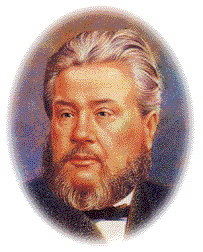
Charles Spurgeon
The Committed Life
This month marks the centennial death of Charles Haddon
Spurgeon. The English Baptist preacher, with his graphic and emotionally charged sermons,
changed the face of evangelical Christianity. Today, one hundred years after his death,
there is more material in print by Charles Spurgeon than by any other Christian author -
alive or dead.
Spurgeon was born in 1834 in an area of Essex, England, with
a long-standing heritage of Protestant resistance. Spurgeon's heroes were dauntless
Protestants who were burned to death for their faith and daring Puritans, such as John
Bunyan, who were jailed for their beliefs.
His conversion came in 1850 at age fifteen. On his way to a
scheduled appointment, he was forced to take shelter from a snow storm in a small country
church where God opened his heart to the salvation message.
Spurgeon explained: "The preacher was reading from
Isaiah 45:22. 'Look unto me and be ye saved, all the ends of the earth; for I am God, and
there is none else.' There was nothing needed - by me, at any rate - except his text.
Then, stopping, he pointed to where I was sitting under the gallery, and he said, 'That
young man there looks very miserable'...and he shouted, 'Look! Look, young man! Look
now!'
"I can never tell you how it was, but I no sooner saw
whom I was to believe than I also understood what it was to believe...As the snow fell on
my road home from the little house of prayer, I thought every snowflake talked with me and
told of the pardon I had found, for I was white as the driven snow through the grace of
God."
Spurgeon preached his first sermon in 1851. From the
beginning of his ministry, his style and ability were noted far above average. His
flamboyance in the pulpit earned him titles such as "the preaching boy wonder"
and "the prince of preachers." He later established a pastor's college that is
still in operation today in South Norwood, England.
Commitment To Jesus Christ
As a compelling speaker, Spurgeon said he had but one
solitary purpose: "I take my text and make a bee-line to the cross." A single
burning desire filled his heart - to see people come to Jesus Christ by faith.
"Saving faith is an immediate relation to Christ, accepting, receiving, resting upon
Him alone, for justification, sanctification, and eternal life by virtue of God's
grace," Spurgeon explained.
Devoted to the Scriptures, to disciplined prayer, and to
godly living, Spurgeon exemplified Christian commitment when he stood in the pulpit. This
itself gave power to his preaching.
However, there was a weaker side to Spurgeon - his health.
One scholar wrote: "Perhaps it is correct to say that as a preacher, Spurgeon had
everything - except good health. He suffered constantly from various ailments and fell
into serious depression at times. He had rheumatic gout that eventually took his life at
the age of fifty-seven."
Through deep physical trials, Charles Spurgeon learned a
lesson concerning his Christian commitment that few dare to engage.
His sermon The Christian's Heaviness and Rejoicing was
written as a result of his physical suffering. In it he says: "My spirits were sunken
so low that I could weep by the hour like a child, and yet I knew not what I wept
for." He was convinced that there were times in each of our lives when heaviness of
heart was needed. "Despondency is not a virtue; I believe it is a vice. I am heartily
ashamed of myself for falling into it, but I am sure there is no remedy for it like a holy
faith in God."
Our Call To Commitment
Suffering equips us to be used by God. It burns away the
selfish side of us that often demands attention and position. God calls each of us to a
firm commitment to Jesus Christ through faith. When we do, the frustrations, the fears,
the pain, the times of resentment, and feelings of isolation lose their power; and Christ
can truly be Lord of all. We, like Charles Haddon Spurgeon, enter a far deeper depth of
spiritual maturity than we ever imagined possible.
Spurgeon said: "I would go to the deeps a hundred times
to cheer a downcast spirit. It is good for me to have been afflicted, that I might know
how to speak a word in season to one that is weary."
In extreme pain and what turned out to be his last sermon on
June 7, 1891, Charles Spurgeon told those gathered: "He [Jesus Christ] is the most
magnanimous of captains. There never was His like among the choicest of princes. He is
always to be found in the thickest part of the battle. When the wind blows cold He always
takes the bleak side of the hill. The heaviest end of the cross lies ever on His
shoulders.
"If He bids us carry a burden, He carries it also. If
there is anything that is gracious, generous, kind, and tender, yea lavish and
superabundant in love, you always find it in Him.
"These forty years and more have I served Him, blessed
be His name! I have had nothing but love from Him. I would be glad to continue yet another
forty years in the same dear service here below if so it pleased Him. His service is life,
peace, joy. Oh, that you would enter on it at once! God help you to enlist under the
banner of Jesus even this day! Amen." |
